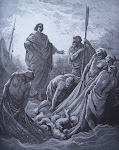We all know the story. The Titanic, a British passenger liner, struck an iceberg off Newfoundland on the night of April 14-15, 1912, and sank. It was a tragedy of enormous proportions.
What a splendid ship! Everything a ship designer could imagine was built into it. It was beautiful, magnificent, TITANIC!
It slid out to sea from Liverpool, England, on a serene April morning. Gleaming against the sky, it was majestic. The pride of Britannia rode out to sea. New York was its next harbor.
The notables of society were its passengers and they basked in the splendor of its luxury. Elegance was the word for Titanic's interior. Lavish in its decor, menus, and entertainment, it surpassed the highest expectations of its passengers.
Three-quarters into its maiden voyage-on the fringe of Newfoundland's frigid banks-the Titanic became a catastrophic nightmare. A deceptively large iceberg, detached from the polar ice fields, was drifting into the North Atlantic shipping lanes, destined to keep a predetermined encounter with the fabulous Titanic.
Within two hours, before the dawn of April 15, 1912, the unsinkable Titanic plunged to its death four miles below the icy surface, taking with it more than 1500 souls (including most of the crew) and all its treasure.
But most remarkable of all, the story of the Titanic has incredibly close parallels to the Biblical plan of salvation as the following points illustrate:
"Not even God could sink the Titanic," was the boast of those who put their confidence in a ship built by men. Today we also have the deadly tendency to have excessive pride in our own resources. "As we travel through life, who really needs God anyway? I can make it on my own."
"Pride goeth before destruction and a haughty spirit before a fall." Proverbs 16:18.
Even when the Titanic struck the iceberg, the crew and passengers were confident that the "small" iceberg could do little damage. We also are deceived into thinking that sin is minor and of little consequence.
"Be not deceived; God is not mocked; for whatsoever a man soweth, that shall he also reap." Galatians 6:7.
Especially following the underwater discovery of the sunken Titanic, maritime experts have suggested that the structural steel then in use in the Titanic's plates became brittle at icy temperatures and may have fractured after simply bumping the iceberg. Thus there was a major flaw in the construction of the steel. It should have been made more flexible, less brittle, so that it would bend and give rather than break. It has been said that the Ark was made by amateurs and the Titanic was made by experts. The difference is that the amateurs were guided by God and the experts made a fatal mistake. Hundreds of people put their trust in the engineering genius and production of man.
"Thus saith the LORD; Cursed be the man that trusteth in man, and maketh flesh his arm, and whose heart departeth from the LORD. . . Blessed is the man that trusteth in the LORD, and whose hope the LORD is." Jeremiah 17:5,7.
Official inquiries determined that the Titanic was traveling too fast for the known icy conditions. The excessive speed seemed reasonable. They wanted to make good time and they believed that the ship was invincible.
"There is a way which seemeth right unto a man, but the end thereof are the ways of death." Proverbs 14:12.
This drama of the sea illustrates the uncertainty of life and our need to be ready to stand before our Maker and Judge. When hundreds of very wealthy people initially boarded the Titanic an imminent death was a thought that was not even entertained. We never know when God will call us to pass from time into eternity.
"And I will say to my soul, Soul, thou hast much goods laid up for many years; take thine ease, eat, drink, and be merry. But God said unto him, Thou fool, this night thy soul shall be required of thee: then whose shall those things be, which thou hast provided?" Luke 12:19-20.
Just as the great pleasure ship struck an iceberg and sank, so also this great world, with all its inhabitants, is slowly sinking into the cold grip of death.
"And as it is appointed unto men once to die, but after this the judgment....For the wages of sin is death." Hebrews 9:27 and Romans 6:23.
One of the problems that resulted in such loss of life was that the Titanic was poorly equipped for such a disaster. There were not enough life boats for the number of people on board. There was only enough room for relatively few to be saved. When it comes to the salvation of sinful men, there is but ONE LIFEBOAT, none other than our Saviour, the Lord Jesus Christ. God's Lifeboat, unlike the small boats on the Titanic, has ample room for all those who recognize the great danger that they are in and who put their trust in God's only Saviour and what He did for them on the cross. Those who refuse God's one Lifeboat will perish.
"I, even I, am the LORD, and beside Me there is no Savior....For God so loved the world, that He gave His only begotten Son, that whosoever believeth in Him should not perish, but have everlasting life." Isaiah 43:11 and John 3:16.
"And this is the record, that God hath given to us eternal life, and this life is in His Son. He that hath the Son hath life; and he that hath not the Son of God hath not life." 1 John 5:11-12.
My friend, as you travel on life's journey, it is possible for you to know for sure that you will arrive safely on eternity's shore. Your decision now will determine your future destiny. God has provided the perfect LIFEBOAT for you. If we can be of spiritual help to you, please contact us.
[This article was adapted from two gospel tracts: 1) The Titanic Encounter by George Genes, The Tract League, 2627 Elmridge Dr., NW, Grand Rapids, MI 49544-1390, Tract #244; 2) Titanic Tragedy by Erik Hollander, Living Waters, Box 1172, Bellflower, CA 90706, Tract #242. Both are used by permission. The illustration is from Grolier Multimedia Encyclopedia, 1998.]
In 1898, 14 years before the Titanic made her maiden voyage, Morgan Robertson published a fictitious book entitled, FUTILITY: The Wreck of the Titan. This was the story of an "unsinkable" massive ocean liner, which like the Titanic, was crossing the Atlantic Ocean (traveling from America to England) in that same month of April, with 3,000 people on board. Trying to cross the ocean in record time, it too struck an iceberg (near midnight) and sank. Not only were the ships’ names very similar, but most on board also perished simply because there was a lack of lifeboats (only 13 survived).


















































